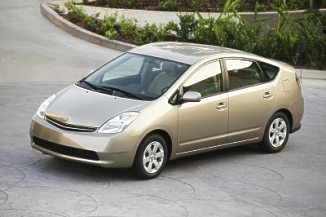
.
April
27, 2005
.
This Week:
-
Scion Announces Third Limited Edition Vehicle for 2005 - The 2005 xA Release Series 2.0
-
Wolfgang Bernhard to assume chairmanship of the Volkswagen brand group starting on May 1, 2005
-
General Motors Honors Yazaki Corporation as Corporation of the Year
-
DaimlerChrysler Group to Sell Its Shares in the Aircraft Leasing Company debis AirFinance
© 1998 - 2005
Copyright &
Disclaimer
Automotive Intelligence,
www.autointell.com
All Rights Reserved .
For questions please contact
editor@autointell.net
|
. R. L. Polk & Co. reports Prius as dominant leader with 64 percent market share
Toyota Prius Photo: Toyota SOUTHFIELD, Mich. - Nationwide registrations for new hybrid vehicles rose to 83,153 in 2004 - an 81 percent increase from 2003 according to R. L. Polk & Co. The Toyota Prius recorded 53,761 new hybrid vehicle registrations in 2004, a 33 percent increase over 2003. The Prius occupies 64 percent of the hybrid market, a sizeable lead over the Honda Civic, which had 25,586 registrations and 31 percent market share. Since the introduction of hybrid vehicles in 2000, the market has grown by more than 960 percent. |
|
"Expectations of continuing high gas prices, combined with the introduction of new models to the consumer market, have heightened interest in hybrid vehicles," said Lonnie Miller, director of Polk's Analytical Solutions. "Hybrids offer improved fuel efficiency and lower emissions while maintaining the functionality and convenience of gasoline-powered vehicles. Hybrid technology is also easy to produce and works within the existing transportation infrastructure."
Hybrid vehicles are automobiles powered by internal combustion engines, but are also equipped with batteries recharged during driving and an electric motor to assist with power demand. There are different levels of hybrids, ranging from minor systems to "full hybrid" systems. Hybrids do not need to be plugged in, yet they deliver superior mileage and are considered environmentally-friendly alternatives to traditional internal combustion vehicles.
Hybrid Buyer Options Expanding
The range of hybrid vehicle choices continues to expand. In addition to the Toyota Prius; Honda Civic, Accord and Insight, and Ford Escape, several new hybrid models were introduced in the past few months including the Dodge Ram, Lexus RX 400h and the Mercury Mariner. The 2006 model year will expect to see the introduction of a hybrid version of the Saturn VUE, Toyota Highlander and the Nissan Altima. Major manufacturers are planning a total of almost a dozen new hybrid vehicles in the next three years.
Regional Strengths
California strongly outpaces all other states in new hybrid vehicle registrations. In 2004 there were 25,021 new hybrid vehicle registrations in California, about 4.5 times that of second place Virginia with 5,613. Washington came in third with 3,441; Florida came in fourth with 3,272 and Maryland rounds out the top five with 3,238 new hybrid vehicle registrations in 2004.
Similarly, Los Angeles remains the top metropolitan area for hybrid vehicles with 10,399 new hybrid vehicle registrations in 2004, more than doubling the total from 2003. San Francisco came in second at 8,051 followed by Washington D.C. with 6,473 new hybrid vehicle registrations. New York came in fourth at 3,779 followed by Seattle with 2,857 new hybrid vehicle registrations in 2004. Each of these markets experienced significant growth in the number of new hybrid vehicle registrations compared with the previous year, a confirmation of the robust strength of this new vehicle segment.
(Apr 25, 2005)
| .
Homepage News Companies Management Publications Events Guestbook Search . |
